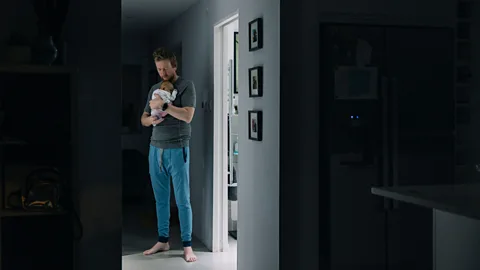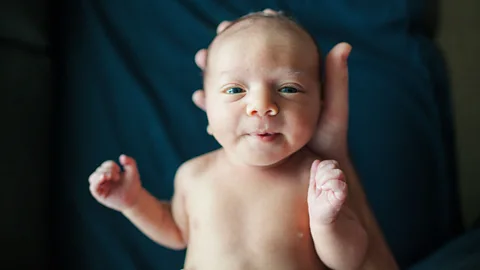Male postnatal depression: Why men struggle in silence
 Getty Images
Getty ImagesMany mothers grapple with mental health challenges after the birth of a child. But fathers experience PND, too – and may be slipping through the cracks.
For David Levine, the watershed moment came when he imagined he had shaken his baby.
It was 2013, and his son was two weeks old. He had put him down on a mat "maybe slightly rougher than I should have", says Levine today. At the time, unable to think straight, he was convinced he'd done worse. As a paediatrician, he knew shaking a baby could cause brain injury, even death. He was horrified.
Levine's anger and frustration had been building since his son's birth. Like many newborns, the baby took time to adjust to the outside world. But to Levine, it seemed like he cried constantly. "I took it personally, like I'm failing, I'm not doing my job here," he says. "I also started feeling like it was directed at me – that my son was crying because he did not like me."
Levine loved children. Since he had begun his career as a paediatrician in New Jersey, US, he'd heard one thing over and over from parents: "You're going to make such a good father someday." He had been excited when his wife became pregnant and gave birth. When she had challenges with breastfeeding, and he could use his medical background to help incorporate formula, he felt useful.
But then his role shifted. He didn't need to be a physician; he needed to be a father. And when the practical tasks of parenthood – like getting his son to stop crying – proved to be a challenge, he thought it was his fault.
"That's when things started to spiral," he says. He belittled and yelled at his son. He started to see graphic images of committing violence to his child and himself. And he didn't see how things would get better. "I would tell my wife that this was the end of our life," he says. "All I could envision was the cycle of hell that was going to be our lives."
In his practise, he screened mothers for postnatal depression (PND) – a depressive illness that sets in within a year of giving birth (often referred to as ‘postpartum depression’ or ‘PPD’ in the US). It's usually seen as a female condition. Could it exist for fathers, too? If so, Levine hadn't heard of it.
He wasn't alone. PND, a mental-health condition which can include feeling persistently low, apathetic or even suicidal in the first year after birth, is a well-established phenomenon in women – even if it is one that still remains underdiagnosed and undertreated around the world, sometimes with tragic consequences.
What's less well known, even to those in the medical field, is that men can get PND, too.
But many of the resources that can help prevent, diagnose and treat PND – from the screening questionnaires that doctors use, to networks like parenting groups – have been built for women. Even the symptoms that people commonly associate with PND tend to pertain more to women than men. Add on the stigma men can feel around expressing mental-health challenges, and experts say that we aren't just missing mothers with PND. Millions of depressed fathers also could be falling through the cracks.
 Getty Images
Getty ImagesHidden disease
"Although there has been rising community awareness about mental illnesses, such as postnatal depression in women, it’s a phenomenon that's much less recognised in men," says Grant Blashki, the lead clinical advisor of Australian mental health organisation Beyond Blue.
Yet it's been estimated that around 10% of fathers are depressed in the first year after birth, a rate twice as high as in the general male population. Some research has indicated that 10% could be too low; in the three- to six-month period after birth, around one in four fathers exhibit symptoms of depression. And a review published in June 2022, which looked at nearly 30,000 couples from 15 countries, found that in 3 in 100 families, both the mother and father experienced postnatal depression at the same time. That would mean that, in the US alone, more than 100,000 babies would experience both parents dealing with PND simultaneously.
Many fathers will also get generalised anxiety, OCD and PTSD, says Daniel Singley, a counselling psychologist in San Diego, California who specialises in men's issues.
But relatively few of these men will reach out – or even believe they have a problem to begin with. “In my practise, it’s interesting that – even if your background is highly educated, or a health professional – there are still high levels of stigma about mental health illness amongst men,” says Blashki. “And this can result in denial or poor help-seeking, or a sense that you should just sort it out yourself."
Generally, men tend to eschew medical care more than women. In Canada, for example, researchers have found that around eight in 10 men won't seek medical care until their partner convinces them to go. But it's also largely due to feelings of embarrassment or shame about being a man – especially a father – with depression. "[Men] really, really don't want to seek mental-health help, because it's stigmatised and feminised. And they really, really don't want to do it during the perinatal period," says Singley.
In heterosexual childbearing couples, he continues, the message usually given to a dad is that pregnancy and birth are a woman's realm. Fathers can be excluded from prenatal appointments, classes or even the labour itself. When they are present, they're often told that their only job is to be ive, no matter what anxieties or fears they, too, may be feeling.
This messaging activates the masculine stereotype of "protect, provide", says Singley, and it overlooks a key element: fathers need to mothers, but they also need . As one dad told researchers in a recent UK study, "Looking back, the institutions, family and myself focussed [sic] on how I would my wife and the emphasis was on me staying strong."
‘We’re supposed to be the rock’
Then, of course, there is the pressure of masculine stereotypes. If fathers are expected to be strong and ive, who are they if they are depressed?
In the same UK study, another participant said he "felt like a failure, no true man". Another asked: "What sort of man gets depressed after they've had a baby">window._taboola = window._taboola || []; _taboola.push({ mode: 'alternating-thumbnails-a', container: 'taboola-below-article', placement: 'Below Article', target_type: 'mix' });
